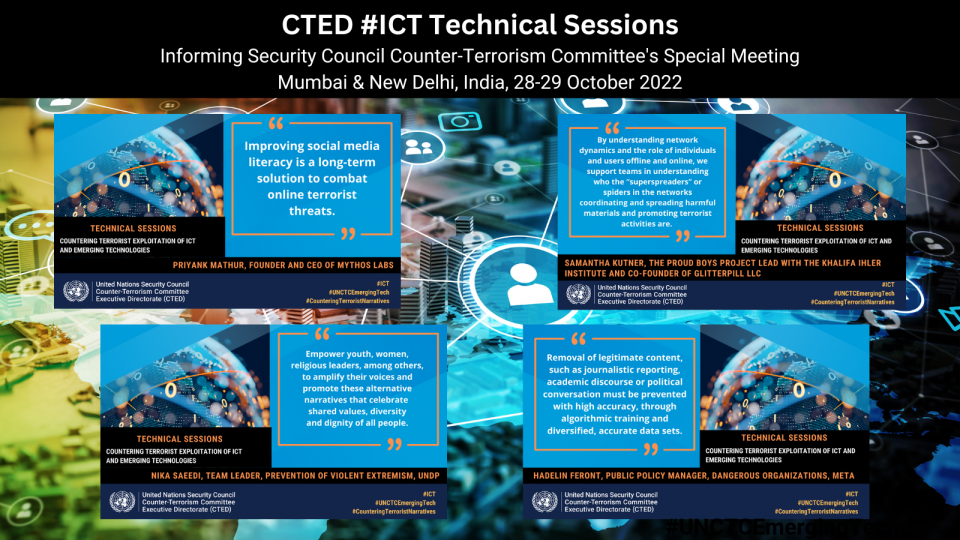
On 30 September and 3 October 2022, the United Nations Counter-Terrorism Committee Executive Directorate (CTED) hosted virtual technical meetings on “Countering terrorist exploitation of information and communications technologies (ICT) and emerging technologies.”
The event was part of a series of six thematic sessions informing the special meeting of the Counter-Terrorism Committee on “Countering the use of new and emerging technologies for terrorist purposes”, to be held on 28-29 October 2022 in India.
Having brought together more than 40 panelists from international and regional organizations (IROs), the private technology sector, academia and civil society organizations (CSOs), the technical sessions pushed forward a new cycle of thinking and future action in addressing challenges posted by terrorist exploitation of ICT. The virtual technical meetings were organized into five sessions, covering key themes to include the latest trends in terrorist misuse of ICT, legal, policy and operational responses by both public and private sector entities and human rights, privacy and gender-related concerns. The two-day event drew more than 500 registrants from around the globe, representing Member States and other relevant operational partners.
In the first technical meeting on 30 September 2022, panelists identified several developments and areas of concern related to the exploitation of ICT and emerging technologies for terrorist purposes. Some of the key trends discussed were the increased use of terrorist operated websites, increased focus on smaller and newer social media platforms, use of grey area content, and decentralized services. Panelists also discussed terrorist use of specific technologies, such as gaming and video platforms and 3D printing technologies for recruitment, financing and other strategic and operational purposes. Given that terrorists exploit “shades of darkness” and continuously adapt their strategies to evade moderation techniques, the speakers highlighted the importance of global and multistakeholder coordination in tackling terrorist content online and in inoculating society against online propaganda and recruitment.
Participants engaged in an in-depth discussion on an array of legal and policy responses by Member States, tech companies and civil society. For instance, non-profit organizations have introduced various research projects and initiatives to facilitate effective and rapid removal of terrorist content online through the development of hash-sharing databases, threat mapping tools and definitional frameworks for terrorism and violent extremism-related content and online activities. Tech companies also discussed several safety measures they implemented to effectively identify and moderate content that violates their community guidelines. Panelists noted Member States’ efforts to develop shared principles around the use of digital technologies.
The second technical meeting on 3 October 2022 focused on operational measures and techniques being used by Member States, tech companies and CSOs to counter the terrorist threat online, including -- but not limited to -- open-source intelligence (OSINT) practices, the use of artificial intelligence (AI) and machine learning algorithms and counter-narratives. Speakers discussed how these operational practices were shared as part of knowledge and capacity building for Member States and society. Speakers emphasized that operational responses must be based on long-term strategies and be agile to quickly adapt to new trends. For instance, counter-narratives should be strategically designed with specific target audiences and objectives in mind and be able to adapt to changing sentiment and behaviour of the targets. They should also look beyond initial engagement to address follow-on actions after target audiences are successfully engaged. Panelists provided examples of preemptive action needed to mitigate risks, such as improving social media literacy.
Participants further engaged in discussions on how to promote and ensure the protection of human rights in counter-terrorism efforts. Expressing concerns about the violations of rights to privacy and freedom of expression caused by de-platforming and content blocking and removal as well as the broader human rights abuses caused by Internet shutdowns and surveillance, panelists stressed the need to place the principles of non-discrimination, necessity, proportionality and the rule of law at the core of all counter-terrorism measures. In addition, they identified several important steps to address human rights concerns, such as mandating oversight of social media platforms, empowering youth and women and promoting alternative narratives that celebrate shared values, diversity and the dignity of all people.
In the concluding session, speakers shared good practices employed by United Nations entities and other IROs in countering terrorist exploitation of online spaces while preserving human rights and fundamental freedoms. They discussed the distinctive roles of different United Nations entities as well as practices to address the root causes of terrorism and violent extremism, both on and offline. The panel also shared thoughts on how capacity-building programmes and multistakeholder measures taken at regional and global levels may need to grow and adapt to ensure the international community and Member States are able to address evolving terrorist threats.
More information here:
https://tinyurl.com/UNCTCEmergingTech
https://tinyurl.com/CTEDTechSessions
To keep abreast of updates about the special meeting through social media, watch out for #UNCTCEmergingTech and follow CTED:
Facebook: www.facebook.com/UnitedNationsCTED
Instagram: www.instagram.com/un_cted/
Twitter: https://twitter.com/UN_CTED

